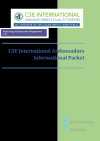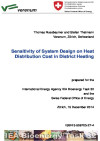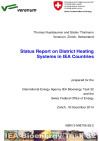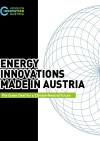Suchergebnisse für "Factsheet: Energietechnologien gestalten, die für alle sinnvoll und nutzbar sind"
IEA C3E TCP: Kick-Off Call with the Austrian Ambassadors (2020)

On the morning of Friday, 26th of June 2020, a kick-off call was organized with the Austrian representatives of the C3E Initiative as well as the newly appointed Austrian Ambassadors for the period of 2020 – 2022.
Herausgeber: IEA C3E TCP
Englisch
Downloads zur Publikation
Conference: Smart Grids Week - Salzburg 2013
13th to 17th of May 2013
Salzburg Congress and Salzburg AG5020 Salzburg, AT
The Smart Grids Week - Salzburg 2013 aims to significantly contribute to the further development of electricity infrastructures.
IEA EBC Annex 55: Reliability of Energy Efficient Building Retrofitting - Probability Assessment of Performance & Cost (RAP-RETRO)
The scope of the project is to develop and provide decision support data and tools for energy retrofitting measures. The tools will be based on probabilistic methodologies for prediction of energy use, life cycle cost and functional performance. The impact of uncertainty on the performance and costs will be considered. Methods based on probability give powerful tools that can provide us with reliable ranges for the outcome.
IEA EBC Annex 70: Building Energy Epidemiology: Analysis of Real Building Energy Use at Scale
Within the framework of the IEA-EBC Annex 70, causes of deviations between calculated and actual energy consumption in buildings were empirically investigated and requirements for data quality, characteristics and security were developed. Furthermore, recommendations were developed regarding the use of internationally uniform standards and methods for data collection, processing and evaluation.
Highlights of Bioenergy Research 2020
January 24th, 2020
Messe Congress Graz, Messeplatz 1, 8010 Graz
National and international results from the IEA Bioenergy Tasks and the ERA-NET Bioenergy
Sensitivity of System Design on Heat Distribution Cost in District Heating (2014)

IEA Bioenergie Task 32
Thomas Nussbaumer, Stefan Thalmann
Herausgeber: Verenum und Schweizer Bundesamt für Energie
Englisch
Downloads zur Publikation
Status Report on District Heating Systems in IEA Countries (2014)

IEA Bioenergie Task 32
Thomas Nussbaumer, Stefan Thalmann
Herausgeber: Verenum und Schweizer Bundesamt für Energie
Englisch, 48 Seiten
Downloads zur Publikation
IEA SHC Task 59/EBC Annex 76: Deep Renovation of Historic Buildings - Towards lowest possible energy demand and CO2 emission (nZEB)
The goal of Task 59 was to document international best practice examples (knowledge base), develop a multidisciplinary planning process, and develop holistic retrofit solutions for historic buildings. As a knowledge base, the Historic Building Retrofit Atlas (www.HiBERatlas.com) emerged from the project. In the HiBERatlas more than 55 best practice examples are documented. In addition to the management of Subtask A (Knowledge Base) and Subtask C (Conservation compatible retrofit solutions & strategies), innovative technical and organizational retrofit solutions, which have already been applied in national demonstration projects and tested in practice, have been incorporated and further developed through the Austrian participation.
IEA-DHC Annex TS2: Implementation of Low Temperature District Heating Systems
The potential of alternative heat sources is highest at low system temperatures, but current district heating networks are usually high-temperature systems. The aim of the IEA DHC Annex TS2 is to support the transformation of district heating networks towards lower temperatures (the so-called 4th generation). For this purpose, Annex TS2 forms an international platform that enables an exchange on the topics of technology, system, demonstration and competitiveness.
IEA EBC Annex 75: Cost-effective Building Renovation at District Level Combining Energy Efficiency & Renewables
For the conversion of existing buildings into low(st) energy buildings with low greenhouse gas emissions, it is important to know which strategies are most cost-effective to reduce emissions and primary energy consumption of the buildings. In particular, it is important to find the right balance between energy efficiency measures and renewable energy measures. This question is addressed in this project.
Energy Innovations made in Austria - The Green Deal for a Climate-Neutral Future

This brochure presents the latest findings in energy research in Austria with examples from cities of tomorrow, decarbonisation of industry, digital transformation and green hydrogen.
Herausgeber: Bundesministerium für Klimaschutz, Umwelt, Energie, Mobilität, Innovation und Technologie (BMK), Klima- und Energiefonds, June 2020
Englisch, 36 Seiten
Downloads zur Publikation
IEA Solar Heating and Cooling (SHC)
The IEA's Solar Heating and Cooling program has been carrying out joint research activities in the field of solar thermal energy since 1977. The focus is on the active and passive use of solar energy for heating and cooling of buildings, solar district heating and solar heat for industrial applications.
IEA HPT Annex 63: Impact of heat pump placement on noise emissions
Noise emissions from heat pumps are a potential barrier for broad market diffusion of this energy efficiency technology, especially in urban areas. In this project, the influences of noise emissions in the building and in the neighbourhood are characterised, their psychoacoustic effects are analysed in more detail, and tools for digitally supporting heat pump placement are further developed. The results will be presented to relevant target groups in the form of guidelines and other documentation.
IEA SHC Task 70: Low Carbon, High Comfort Integrated Lighting
With the goal of decarbonization and sustainability of buildings in the sense of the circular economy, for integrated lighting systems the so far purely energy-based focus must be broadened to include the entire life cycle, with special consideration of visual and non-visual user requirements. In the task, strategic, technical, and economic information will be developed for the relevant stakeholders and networking activities will be offered.
IEA SHC Task 55: Integrating Large SHC Systems into DHC Networks
Despite the large potential for integrating large solar thermal plants into district heating and cooling networks, the share of solar heat worldwide is below 1%. The aim of this project was to analyse the technical, economic, and regulatory barriers that hinder a faster market development of such systems, and to propose solutions to support the growing heat market. The results (roadmaps, data, information) are available in the form of fact sheets.
IEA SHC Task 68: Efficient Solar District Heating Systems (Working period 2022 - 2024)
Regarding the use of CO2-free technologies for local/district heating systems, solar technologies in particular offer an efficient option. In this task, the opportunities and challenges are investigated in order to efficiently provide the required temperatures necessary for local/district heating networks through solar technologies, to promote digitalisation, to identify new business models and measures for cost reduction, and to spread the knowledge about the potential of solar district heating systems.
IEA Electric Vehicle Technology Collaboration Programme (EV-TCP)
The Technology Collaboration Programme on Electric Vehicles (EV TCP) vision is that the electric drivetrain will be used as the predominant transportation mode in a sustainable transport system that is preferably powered by renewable energy and does not produce harmful emissions.
Conference: Smart Grids Week - Graz 2014
May 19th to 23rd, 2014
Energie Steiermark and CONGRESS GRAZGraz, AT
The Smart Grids Week - Graz 2014 aims to significantly contribute to the further development of electricity infrastructures and to link the Austrian Smart Grids activbities with the European initiatives.
IEA SHC Task 67: Compact Thermal Energy Storage Materials within Components within Systems
This Task aims to push forward the compact thermal energy storage (CTES) technology developments to accelerate their market introduction through the international collaboration of experts from materials research, components development and system integration. These technologies are based on the classes of phase change materials (PCM) and thermochemical materials (TCM). Materials from these classes will be studied, improved, characterized and tested in components.
Co-Operative Programme on Advanced Materials for Transportation Applications (AMT)
The AMT Technology Programme (AMT-TCP) focuses on creating innovations in material technologies to increase energy efficiency and reduce carbon emissions to allow global warming mitigation.
